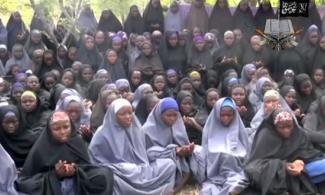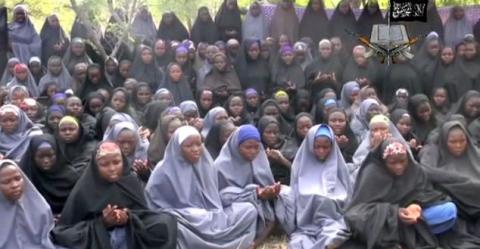
The town of Chibok has never been the same
since the infamous abduction of schoolgirls that attracted global
attention to it over five years ago.

Today is exactly 2,000 days since the abduction of 276 schoolgirls
from Government Girls Secondary School in Chibok, Borno State, on
April 14, 2014, but President Muhammadu Buhari and his regime have
said no word on concrete plans to bring back the remaining
schoolgirls.
Daily Trust reports that the town of Chibok has never been the same
since the infamous abduction of schoolgirls that attracted global
attention to it over five years ago.
While some of the schoolgirls have been found, at least 113 are still
missing, and it is not yet clear if they are still alive.
It is also not clear whether they have been married off, or under
whose custody they are, considering the changes that occurred in the
ranks of the Boko Haram, the violent group that abducted them during
the sole leadership of Abubakar Shekau.
Hours after the abduction on April 14, 57 of the girls found their way
back home, and some years later, a few others escaped captivity, while
the government negotiated with the abductors and freed over 100. A
group, the Abducted Girls Parents’ Movement for Rescue, in its
relentless effort to secure freedom of the remaining 113 captives, has
been reaching out to relevant authorities and non-governmental
organizations that played one role or the other in the previous
negotiations.
Women leader of the group, Mrs. Yana Galang, whose daughter is among
the 113 still in captivity, lamented that concerned authorities are
allegedly not much concerned about freeing their daughters. “We were
frequently being invited to Abuja for talks while the government was
facilitating negotiations that led to the freedom of those over 100
girls,” she said.
“But since a batch of 83 girls was released two years ago, nobody has
ever contacted us again for any talks about rescuing the remaining
ones,” she said. “I have suffered a lot from insurgency,” Rachael
Daniel, mother of Rose who is still in captivity, said.
“My husband, Daniel, was first killed along Dikwa highway. And later,
my daughter, Rose Daniel, 17, was kidnapped at GSS Chibok. “Life is
frustrating; I think life is not fair to me; I am always depressed,”
she said.
Mr. Ayuba Alamson doubles as a guardian of his abducted sister and
spokesman for parents of Chibok girls.
The sister, Hadiza Kwagui, was, however, among the first set of
escapees while been led into Sambisa forest by their abductors on the
fateful day.
Alamson expressed another form of grief and dejection suffered by the
freed girls and their parents, following the government’s alleged
failure to fulfil its promise of sponsoring their education.
His sister, Hadiza, sat for her secondary school examination, full of
hope that the government was sponsoring her higher education.
“Unfortunately, since they wrote their WAEC and NECO at Bethel
International School in Jos, they have been abandoned to date,”
Alamson said.
“In fact, Hadiza is in the village now and some of her friends have
gotten married out of frustration. Some of these girls are now farming
in the village despite what we heard that they had been offered
scholarships to study up to degree level,” he lamented.
However, Yana Galang, who is the woman leader of the parents’
association of the abducted Chibok girls, thanked the federal
government for securing the release of more than 100 of the abducted
schoolgirls but said those who are yet to see their daughters are
still grieving.
She said her daughter, Rifkatu Galam, is still with the insurgents,
adding “My daughter was 18 when the abductors took her away.”